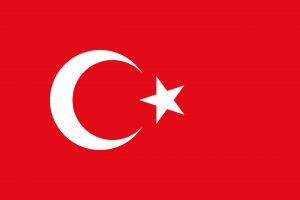Difference between revisions of "Language/Turkish/Grammar/Gender"
m (Quick edit) |
m (Quick edit) |
||
| Line 117: | Line 117: | ||
|description=In this lesson, we will learn about the gender rules in Turkish grammar. We will look at the rules for nouns, adjectives, and pronouns. We will also look at some examples and practice using the rules. Finally, we will have a quiz to test your understanding. | |description=In this lesson, we will learn about the gender rules in Turkish grammar. We will look at the rules for nouns, adjectives, and pronouns. We will also look at some examples and practice using the rules. Finally, we will have a quiz to test your understanding. | ||
}} | }} | ||
==Related Lessons== | |||
* [[Language/Turkish/Grammar/Present-Continuous-in-Turkish|Present Continuous in Turkish]] | |||
* [[Language/Turkish/Grammar/Count-from-1-to-10|Count from 1 to 10]] | |||
* [[Language/Turkish/Grammar/Personal-Pronouns|Personal Pronouns]] | |||
* [[Language/Turkish/Grammar/Negation|Negation]] | |||
* [[Language/Turkish/Grammar/The-Inclusive-Case-in-Turkish|The Inclusive Case in Turkish]] | |||
* [[Language/Turkish/Grammar/The-Genitive-Case-in-Turkish|The Genitive Case in Turkish]] | |||
* [[Language/Turkish/Grammar/Adjectives|Adjectives]] | |||
* [[Language/Turkish/Grammar/Future-Tense|Future Tense]] | |||
* [[Language/Turkish/Grammar/The-Locative-Case-in-Turkish|The Locative Case in Turkish]] | |||
* [[Language/Turkish/Grammar/Past-Tense|Past Tense]] | |||
{{Turkish-Page-Bottom}} | {{Turkish-Page-Bottom}} | ||
Revision as of 21:36, 25 February 2023
Hi Turkish learners! 😊
In this lesson, we will learn about the gender rules in Turkish grammar. We will look at the rules for nouns, adjectives, and pronouns. We will also look at some examples and practice using the rules. Finally, we will have a quiz to test your understanding. Let's get started!
Nouns
In Turkish, nouns are either masculine or feminine. There is no neutral gender. To determine the gender of a noun, you need to look at the last letter of the word.
- If the last letter is a consonant, the noun is masculine.
- If the last letter is a vowel, the noun is feminine.
Examples
| Turkish | Pronunciation | English Translation |
|---|---|---|
| ev | ehv | house |
| araba | ah-rah-bah | car |
| kalem | kah-lem | pen |
| masa | mah-sah | table |
| kız | keez | girl |
As you can see from the examples above, the nouns ending with a consonant (ev, araba, kalem) are masculine, while the nouns ending with a vowel (masa, kız) are feminine.
Adjectives
Adjectives must agree with the nouns they modify in gender.
- If the noun is masculine, the adjective must be in the masculine form.
- If the noun is feminine, the adjective must be in the feminine form.
Examples
| Turkish | Pronunciation | English Translation |
|---|---|---|
| güzel ev | goo-zehl ehv | beautiful house |
| güzel araba | goo-zehl ah-rah-bah | beautiful car |
| güzel kalem | goo-zehl kah-lem | beautiful pen |
| güzel masa | goo-zeh-lah mah-sah | beautiful table |
| güzel kız | goo-zehl keez | beautiful girl |
As you can see from the examples above, the adjectives must agree with the gender of the nouns they modify.
Pronouns
Pronouns must also agree with the nouns they refer to in gender.
- If the noun is masculine, the pronoun must be in the masculine form.
- If the noun is feminine, the pronoun must be in the feminine form.
Examples
| Turkish | Pronunciation | English Translation |
|---|---|---|
| o ev | oh ehv | that house |
| o araba | oh ah-rah-bah | that car |
| o kalem | oh kah-lem | that pen |
| o masa | oh mah-sah | that table |
| o kız | oh keez | that girl |
As you can see from the examples above, the pronouns must agree with the gender of the nouns they refer to.
Practice
Now it's time to practice what you've learned. Try to fill in the blanks with the correct gender form of the words.
1. O ____ ev güzel. (masculine) 2. O ____ araba güzel. (feminine) 3. O ____ kalem güzel. (masculine) 4. O ____ masa güzel. (feminine) 5. O ____ kız güzel. (feminine)
Answers: 1. O güzel ev. 2. O güzel araba. 3. O güzel kalem. 4. O güzel masa. 5. O güzel kız.
Quiz
Let's test your understanding with a quiz.
Questions
1. What is the gender of the noun "araba"? 2. What is the gender of the noun "kalem"? 3. What is the gender of the noun "masa"? 4. What is the gender of the pronoun "o" when referring to a masculine noun? 5. What is the gender of the pronoun "o" when referring to a feminine noun?
Answers
1. Masculine 2. Masculine 3. Feminine 4. Masculine 5. Feminine
➡ If you have any questions, please ask them in the comments section below.
➡ Feel free to edit this wiki page if you think it can be improved. 😎
Related Lessons
- Present Continuous in Turkish
- Count from 1 to 10
- Personal Pronouns
- Negation
- The Inclusive Case in Turkish
- The Genitive Case in Turkish
- Adjectives
- Future Tense
- The Locative Case in Turkish
- Past Tense
